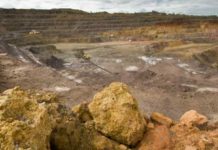
ANGLO American on Thursday said its diamond and steelmaking coal businesses would be loss-making in the first half of its financial year.
This was owing to poor market conditions for its 85%-owned De Beers and production interruptions for its coal, and comes just as the miner looks to sell both businesses in terms of its portfolio simplification strategy unveiled in May last year.
US-backed tariffs dealt a blow to polished diamond trading in the second quarter, which had previously shown signs of stabilisation, Anglo said. In addition, there was ongoing price weakness in rough diamonds, down 5% on average for De Beers and reflecting a 14% decline in the index price.
Amid these difficult conditions, De Beers also sold about 800,000 carats of diamonds at discounts from its stockpile in the second quarter. According to reports, the stockpile is worth $2bn in unsold goods.
The outcome for De Beers was higher second quarter revenue as the stock was cleared ($1.19bn in 2025 versus $1.04bn in 2024), which was sold at major discounts. “Accordingly, we expect to report negative underlying EBITDA for De Beers in the first half of 2025,” Anglo said in its trading statement.
Anglo said “a formal process” for the sale of De Beers was advancing despite the market difficulties. De Beers has attracted interest from at least six consortia, including commodities billionaire Anil Agarwal, Indian diamond firms and Qatari investment funds, including one led by former De Beers MD Gareth Penny.
Anglo said it was also progressing with the proposed $3.8bn sale of its remaining steelmaking coal mines in Australia to US group Peabody Coal. This is despite an “ignition event” at Moranbah North resulting in its shutdown. Peabody subsequently said it was reviewing its agreement to buy the Anglo mines under material adverse change conditions that enable buyers to revoke their intention to purchase.
Anglo CEO Duncan Wanblad said “good progress” had been made at Moranbah, with a restart “expected in due course”. He added: “On this basis, we continue to believe that this event does not constitute a material adverse change under our agreements with Peabody.”
Steelmaking coal production decreased by 51% to 2.1 million tons in the first half, partly owing to Moranbah North as well as the 2024 shutdown of Grosvenor following a fire and the sale of Anglo’s stake in Jellinbah in January.
Given the combination of lower production and a decline in the average price for hard coking coal ($172/ton compared to the benchmark price of $185/ton), Anglo said the division would be loss-making for the first half of 2025.
On a positive note, there was an improvement in production from Quellaveco, its copper mine in Peru, and an overall solid performance from the division with output up 3% from the first quarter, but 11% lower year-on-year.
Iron ore production improved 3% quarter-on-quarter with an improvement in stock levels reported by Anglo’s 70%-owned Kumba Iron Ore. Stocks fell to 7.4 million tons from 7.8Mt in the previous quarter as port inventories returned to “normalised” levels, Anglo said.
But it is the performance of diamonds and steelmaking coal – assets that Anglo is attempting to sell in terms of its portfolio simplification plan – that will worry Wanblad most.










